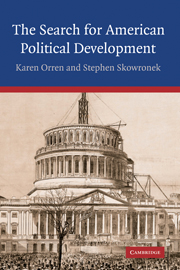2 - Unraveling the Premise: The Cultural Critique
Published online by Cambridge University Press: 24 May 2010
Summary
We Americans are the peculiar, chosen people – the Israel of our time; we bear the ark of the liberties of the world … The rest of the nations must soon be in our rear. We are the pioneers … the advanced guard, sent on through the wilderness of untried things to break a new path in the New World that is ours … Long enough have we been skeptics with regard to ourselves and doubted whether, indeed, the political Messiah has come. But he has come in us, if we would but give utterance to his promptings.
Herman Melville, White JacketExamining political development in the united states is tantamount to interrogating the national premise. Faith in development, with this nation in the vanguard of development, are relentless themes of the culture, inscribed in stories about the origins, common struggles, and higher purposes of the American people. The master narrative of American politics tells of a land set apart by Providence to “bear the ark of the liberties of the world,” of a nation released from power relationships accumulated by the “Old World” to “break a new path,” of “pioneers” who cleared the way for humankind's advance.
The scholars of the late nineteenth century who first turned American political development into a topic for critical inquiry knew exactly what they were doing. They were the embodiment of Melville's “skeptics with regard to ourselves,” avowed in their determination to subject the cornerstones of American national identity to empirical scrutiny.
- Type
- Chapter
- Information
- The Search for American Political Development , pp. 33 - 77Publisher: Cambridge University PressPrint publication year: 2004



